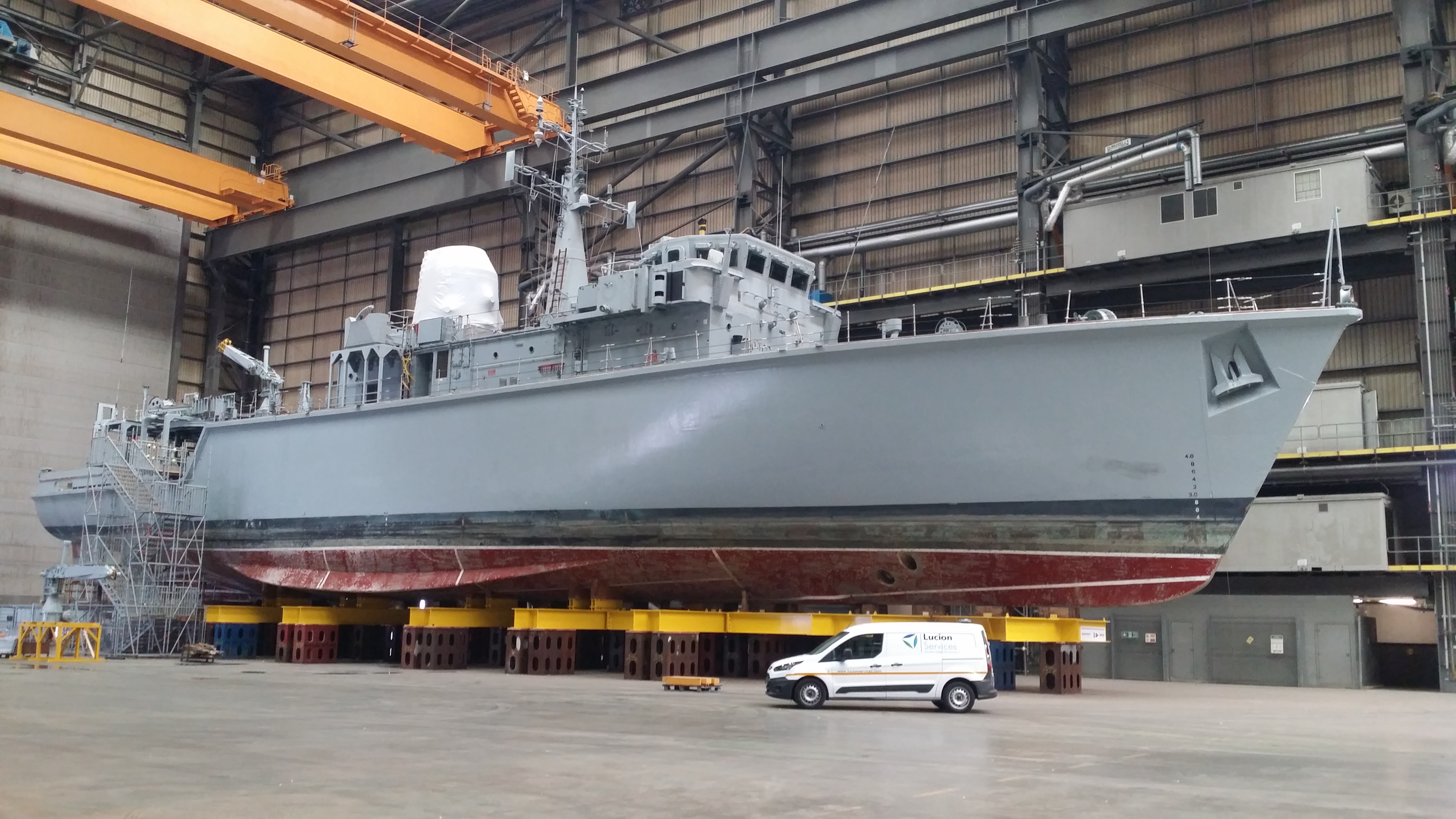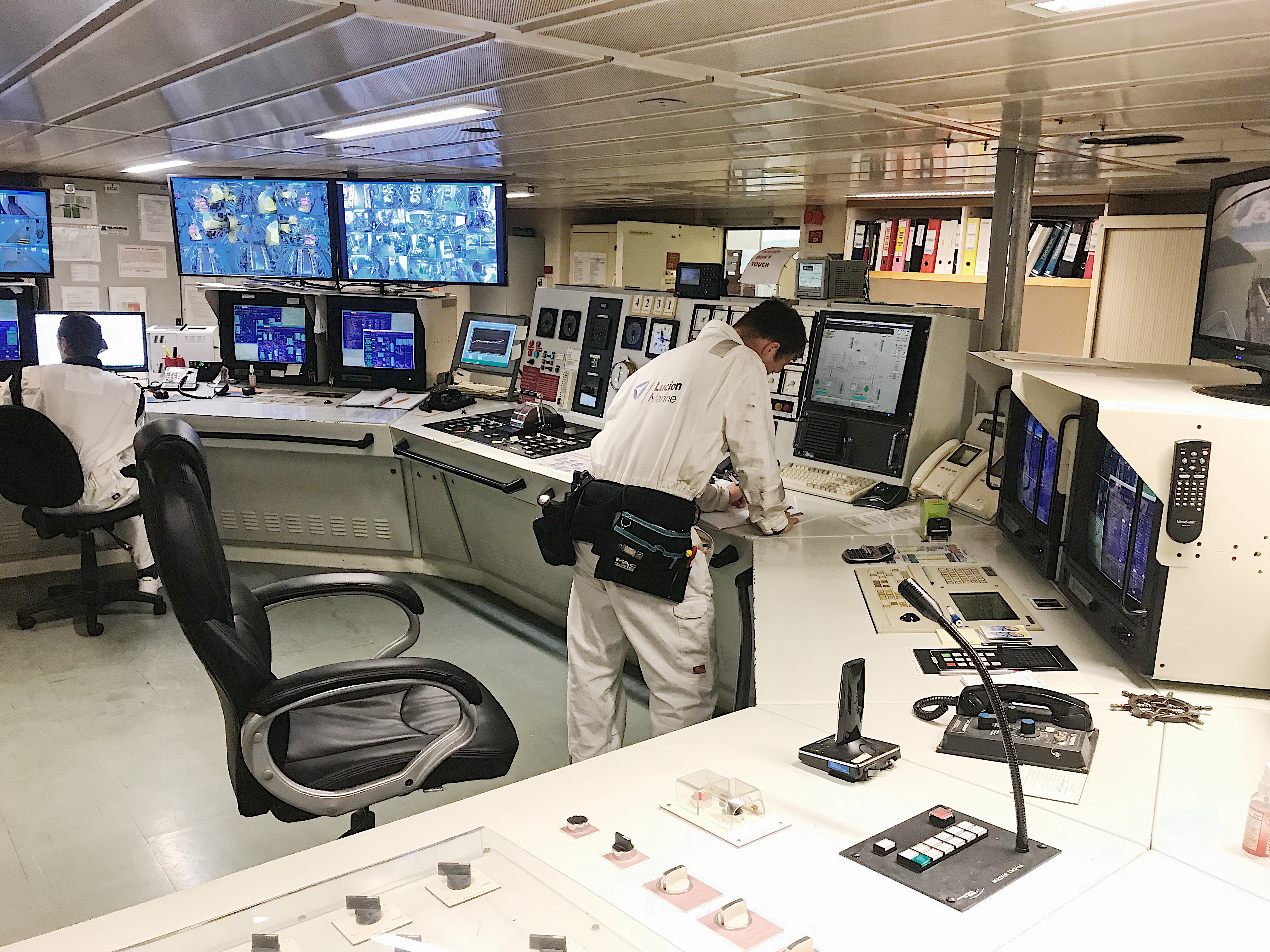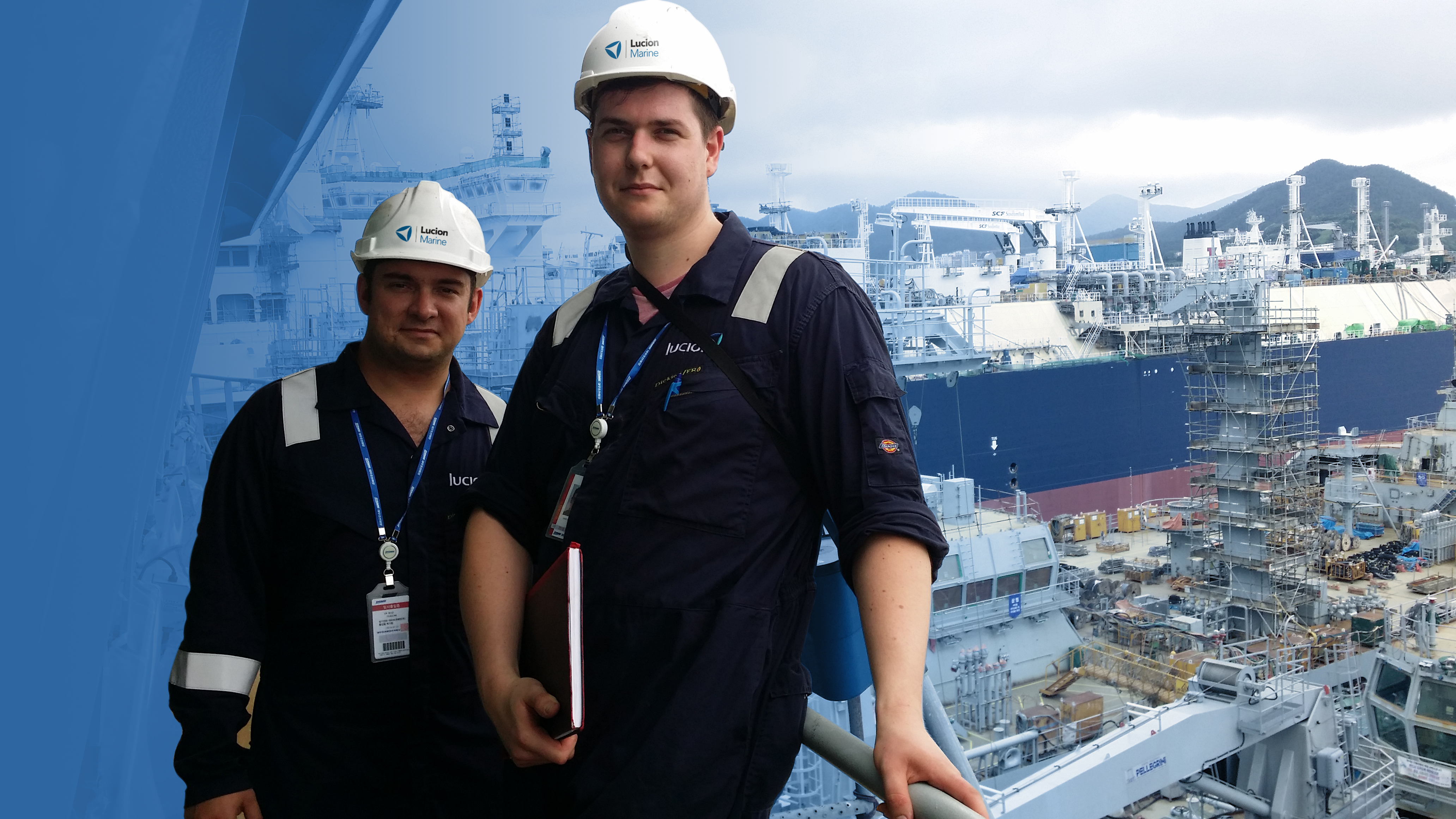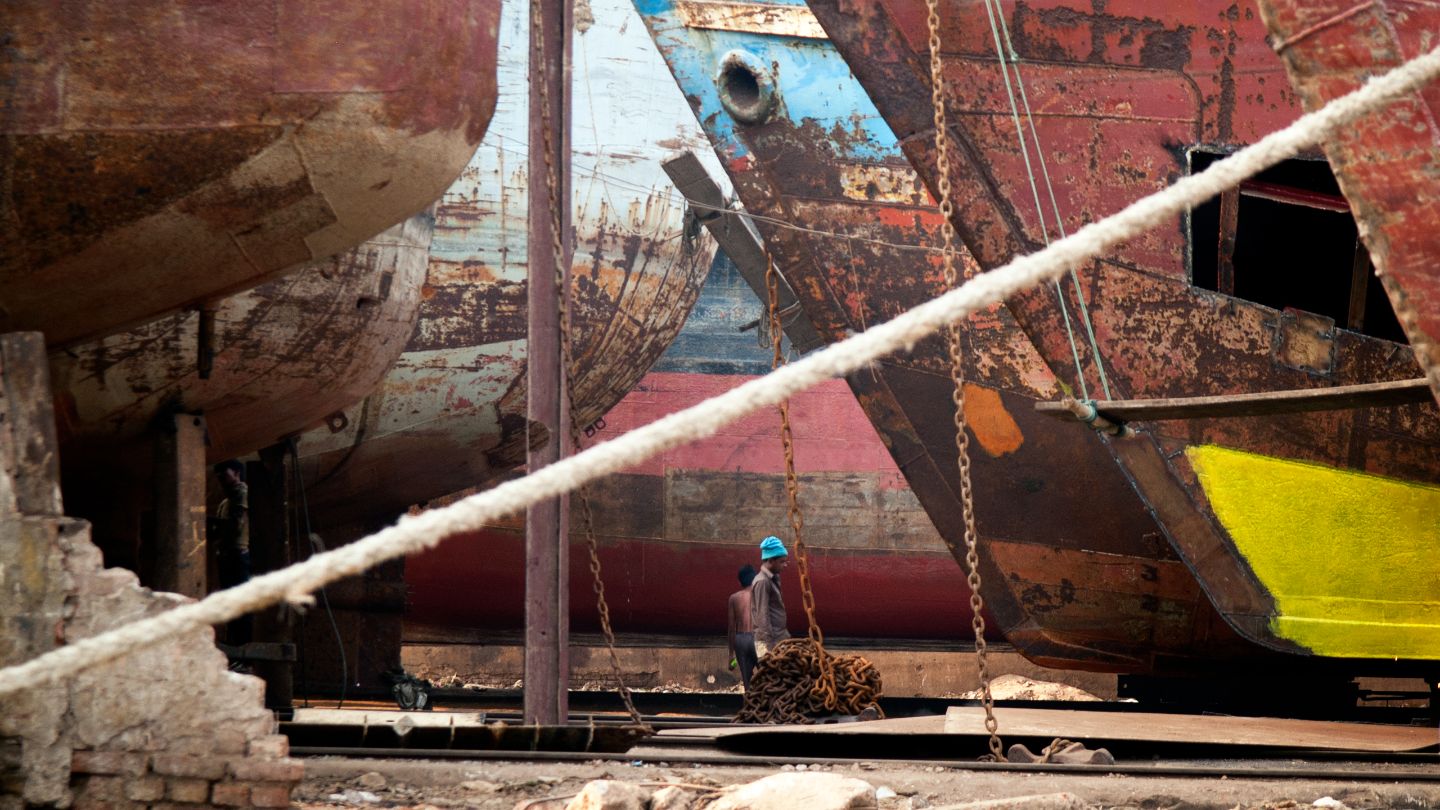You've Had Your IHM And Discovered Asbestos Aboard Your Ship. What’s Next?
15 October 2020
With the EU SRR Inventory of Hazardous Materials (IHM) deadline approaching, many of the ships which fall under the scope of the new rules are now in possession of an IHM, either certified by a Registered Organisation (RO) or are currently in the process of certification. As more IHM’s are complete, there is significant evidence that a larger than expected number of the ships inspected have asbestos on board in various forms - wall panelling, insulation, paint and gaskets among others.
Marine Services Director Kevan O’Neill states around 60% of ships that have undergone an IHM survey with Lucion Marine have been identified to contain asbestos (although figures given by different organisations differ). Whilst not all asbestos poses a high risk to crews and shipyard workers, the question for shipowners and technical managers is how best to deal with asbestos-contaminated materials to keep the crew safe and satisfy all stakeholders, Class, Flag, charterer, financier and ultimately, the recycler.
Why is asbestos on ships a hot topic right now?
According to a study by the Int J Environ Res Public Health an estimated 255,000 people per year die from asbestos-related diseases globally. Due to the high content of asbestos products used in ships, shipyard workers are one of several occupations labelled as high risk for most frequently exposed to asbestos. Asbestos exposure is the number one cause of work-related deaths globally and is the leading cause of 90% of mesothelioma cases.
Kevan O’Neill commented stating:
“Whilst the percentage rate for finding asbestos on ships through the IHM survey is high, this isn’t necessarily a cause for immediate concern. When asbestos is identified it is assessed and given a certain category of risk. To identify the level of risk, we must first determine the material, its application, location, whether or not it can be safely managed in situ, or whether the material needs to be removed. Friable materials that pose higher risks to the crew and the environment may need to be considered for immediate removal.”
A detailed Asbestos Management Plan (AMP) can be implemented to ensure safe management and monitoring of asbestos-containing materials onboard, the AMP can also support any application for a temporary exemption status from the requirements under SOLAS from flag registry.
Thomas Klenum, Senior Vice President, Maritime Operations, Fellow of the Royal Institution of Naval Architects (FRINA), Liberian Registry commented;
“Discovering asbestos onboard existing vessels is all about managing the risk to the seafarers’ health, and therefore if an IHM Expert Company identifies asbestos onboard one of our Liberian flagships we generally apply the guidelines developed by IMO MSC.1/Circ.1374 'Information on prohibiting the use of asbestos onboard ships' that requires removal within 3 years. If the asbestos is not immediately removed we could issue an exemption certificate and require the ship management company to implement a maintenance and monitoring programme, which should be included in the company’s Safety Management System taking into account guidance provided by IMO in MSC/Circ.1045 'Guidelines for maintenance and monitoring of onboard materials containing asbestos'”.
"There may however be special cases where a risk assessment study demonstrates the removal of asbestos exposes a higher risk to the seafarers' health than containing the asbestos through a strict maintenance and monitoring programme with suitable risk control measures in place. This is where Liberian Registry’s technical expertise and pragmatism becomes an advantage for the seafarers and the shipowners. We understand the shipowners, we are experienced, shipping people.”
Jon Chaplin, RINA certified HazMat Expert and Marine Business Development Manager, urges shipowners to organise an Asbestos Management Plan without delay.
"Although asbestos-related claims are often regarded as a thing of the past, there is growing evidence that seafarers are still routinely being exposed to asbestos on ships. The majority of occupational disease claims are linked to seafarer exposure to asbestos on ships, some dating back as far as the 1950s. It can take up to 40 years before the symptoms of asbestos start to appear."
"Dealing with asbestos on board need not be a major headache for shipowners - Lucion's vast experience handling asbestos means clean ships, safe crew and protected asset values without the drama."
What are the SOLAS requirements for the removal of asbestos on ships?
The International Convention for the Safety of Life at Sea (SOLAS) 1974 (as amended) is generally regarded as the most important of all international treaties concerning the safety of merchant ships.
The main aim of the SOLAS Convention is to provide minimum standards for the construction, equipment and operation of ships, ensuring safety to crews and the environment. Flag States are responsible for ensuring that ships under their flag comply with the SOLAS requirements, and a number of certificates are prescribed in the Convention as proof of compliance.
Over the years, the International Maritime Organisation (IMO) has increased restrictions relating to asbestos-containing materials on vessels through the SOLAS framework.
Any ship built before 2002, must be presumed to contain asbestos (unless proven otherwise) and must have a hazardous materials’ register and management plan in place to cover any maintenance or repair work involving asbestos.
Under the SOLAS convention, asbestos found onboard a ship built between July 2002 and 2012, the vessel’s flag registry, in conjunction with its classification society, must issue a non-extendable exemption certificate, providing the owner with a three-year window in which to remove the asbestos, where necessary.
Since 2011, under International Convention for the Safety of Life at Sea SOLAS (resolution MSC.282(86) amendment 2009 regulations, installation of asbestos-containing materials is prohibited on all ships, no exceptions. Any ships built after 2012 should not contain asbestos, however, this isn’t always the case.
John Stawpert, Manager (Environment and Trade) at the International Chamber of Shipping commented:
"The dangers of asbestos are well known, and shipowners generally are experienced in managing it safely. The recommended removal of asbestos that contravenes SOLAS within three years of identification can present challenges both in terms of safety and cost, and this, therefore, requires pragmatism on behalf of all those involved, particularly the flag and shoreside authorities. Principles for the sound management of asbestos are well established, and amply covered by MSC/Circ.1045, and these should be followed where the material is identified. Similarly, the development of Inventories of Hazardous Materials in accordance with the Hong Kong Convention and industry guidance facilitate the identification and subsequent sound management of asbestos where it is found onboard, and this can strengthen safety for crews and other personnel working onboard ships where asbestos is present.”
My ship has been classed as asbestos-free, do I need to be concerned?
Asbestos was thought likely to be present on a significant number of ships built post-2012. These ships have been labelled as ‘asbestos-free’ and in most cases delivered with certification. However, Rory Butler and Senior Associate and Jenny Salmon of specialist World Leading Maritime Lawyers HFW expressed in a recent article that shipowners may not be able to confidently rely on certification that a vessel is asbestos-free:
"Similarly, shipowners cannot assume that certification by the vessel’s current or previous Classification Society that the vessel is compliant with SOLAS means that the vessel is free from asbestos. Such certifications are often based on the shipyard’s own confirmations or those of the yard’s supplier/subcontractor, without any independent checks (or sometimes any checks at all) of the actual materials installed on board having been carried out by Class. Certification can be issued based on documentation which is inaccurate, rather than on testing carried out by the certifying party. Therefore, shipyards, Classification Societies and surveyors may believe a material installed on a vessel is “asbestos-free” and may certify it accordingly, but that material may not have been tested for asbestos or may have been batch-tested without the presence of asbestos being detected in the actual material used."
Lucion Marine’s Senior Marine Principal John Chillingworth stated:
"The term ‘asbestos free’ can be a misleading one, due to the different international standards that constitute exactly what it means. For example, in the USA, asbestos can be present in material up to a 1.0% content and be classed as ‘asbestos-free’. In the EU it is 0.1% and 0% in Australia where regulations for asbestos are much stricter.
China has no official standard – indeed, our surveyors have found as much as 15% asbestos in materials that have been declared free in China. The problem is compounded by the fact that there is no testing and certification of materials by manufacturers.”
The amount of asbestos found onboard depends on several factors, including where the ship was built. Where material and equipment originates from China, it is still legal to use asbestos. Chinese manufacturers may set up a production line to supply ‘asbestos free’ materials, but they could also be unaware of cross-contamination in their factory emanating from other production lines that are producing items containing asbestos. Should these affected materials be used on a ship, it is plausible that an ‘asbestos-free’ certified ship is anything but compliant.
Additionally, ships can also be affected by asbestos-containing materials when new equipment and materials are brought on board.
What should I do if asbestos is found on my ship during my IHM?
The IHM survey may be conducted by a HazMat expert company, such as Lucion Marine, which has the experience and resources to undertake a comprehensive survey and can provide reliable, independent results. Should asbestos be found during the IHM survey, engaging a specialist maritime asbestos consultant is key to ensuring you make the correct choices regarding removal and management of asbestos on your vessel.
With internationally recognised ISO 17025 accredited laboratories, and a specialist team of hazardous materials surveyors, analysts, and consultants strategically located across the globe, our Lucion Marine team delivers trusted consultancy, surveying, testing and management for asbestos and other hazardous material management to fleets and vessels throughout the world.
“Lucion's diligence and commitment to providing us with a service of high quality coupled with both integrity and honesty has been continuous and they have always been happy to provide advice and guidance on all matters related to the management of Asbestos Management. We will continue to use Lucion and would be hard-pressed to find a company who understands our procedures and risks with such consideration and understanding. Lucion come highly recommended on all fronts.”
Servicing the global marine industry since 2002, we have completed in excess of 600 IHMs on a wide variety of vessels including, passenger cruise vessels, tankers, container vessels, bulk carriers, FPSOs, ferries, PSVs, Superyachts, and offshore platforms. From asbestos surveying, identification and management to asset recycling, dismantling and disposal consultancy, Lucion assists clients in all aspects of compliance with SOLAS, the Hong Kong Convention and the EU Ship Recycling Regulations.
Lucion Marine is approved by the following IACS Classification Societies:
What Should You Do If You Discover Asbestos?
Does your team know what to do in the event that they find asbestos? Use our simple asbestos discovery flowchart to inform your teams about what to do when suspected asbestos is discovered.
Download Now
Inventory of Hazardous Materials Guide
The Inventory of Hazardous Materials (IHM) is a structured system to control hazardous materials onboard ships and achieve compliance with the EU Ship Recycling Regulation (EU SRR) and Hong Kong Convention (HKC) for the Safe and Environmentally Sound Recycling of Ships. Read Lucion Marine clients' most frequently asked questions and answers.
_1.png)
Download From NexGen


 NexGen
NexGen












